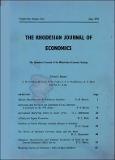| dc.contributor.author | Harris, P. S. | |
| dc.coverage.spatial | Zimbabwe | en |
| dc.date.accessioned | 2015-09-14T11:50:54Z | |
| dc.date.available | 2015-09-14T11:50:54Z | |
| dc.date.issued | 1972-06 | |
| dc.identifier.citation | Harris, P.S. (1972) Regression and Inertia in the the Rhodesian Fiscal Structure— a Comment on the 1972 Budget. The Rhodesian Journal of Economics (RJE), vol. 6, no.2, (pp. 9-20). UR (now UZ), Salisbury (now Harare): RES. | en |
| dc.identifier.uri | https://opendocs.ids.ac.uk/opendocs/handle/20.500.12413/7011 | |
| dc.description | An analysis of the Rhodesian budget statement of 1972. | en |
| dc.description.abstract | It is my intention in this paper to comment on the structure of the budget and on Rhodesian fiscal policy in the light of this budgetary structure. I have two basic observations to make. The first is that the 1972 budget is, in structural terms, entirely as was to be expected and it may, in fact, be interpreted as one further budget which has the effect of maintaining a gradual but consistent regressive shift in the fiscal structure. The second is that the structure is not only regressive, but also fairly rigid, and the budgetary principles that have formed the basis of not only this, but also a succession of budgets prior to this, have had the net effect of reducing the impact of fiscal policy on the general level of economic activity. This second observation should not be interpreted as implying a reduction in the influence of the state in the economy but rather as an implication that other, non-fiscal methods, have been increasingly employed in an effort to achieve desired objectives.
Generalisations, by definition, seek to simplify complex situations by reference to dominant characteristics. The test of validity, when applied to generalisations, is not whether simplification obscures detail, but whether this suppression of detail is in fact misleading. My basic thesis is that discussion and analysis of the Rhodesian budget is very often concerned with detail, to the extent that general principles are often overlooked. Further, the details themselves are carefully woven into the general fabric of this structure, and thus an overview is the most efficient way of gaining an insight into the detail. | en |
| dc.language.iso | en | en |
| dc.publisher | Rhodesian Economic Society. (RES) University of Rhodesia (UR) (now University of Zimbabwe.) (UZ.) | en |
| dc.rights.uri | http://creativecommons.org/licenses/by-nc-nd/3.0/ | en |
| dc.subject | Finance | en |
| dc.title | Regression and Inertia in the the Rhodesian Fiscal Structure— a Comment on the 1972 Budget | en |
| dc.type | Article | en |
| dc.rights.holder | University of Zimbabwe (UZ) (formerly University College of Rhodesia) | en |


